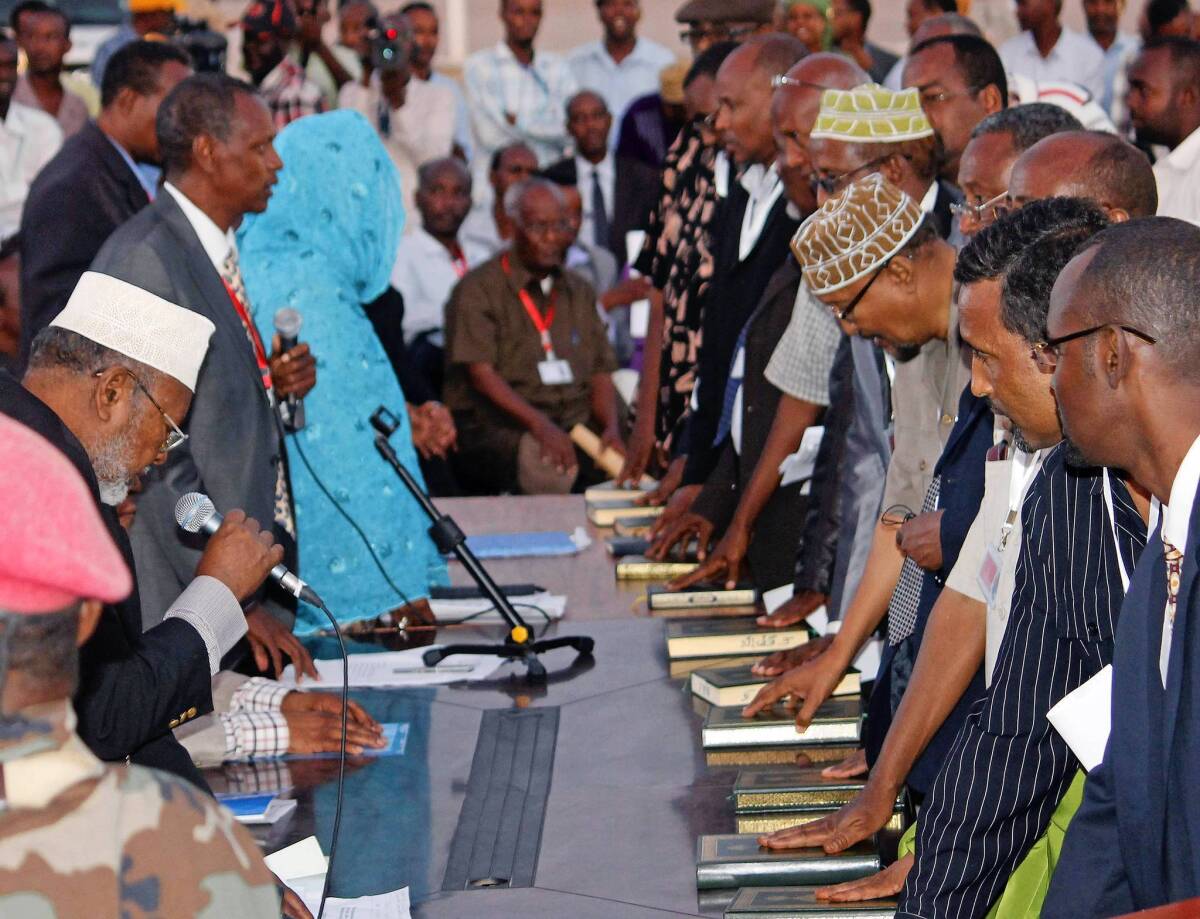Somalia has new parliament but no president yet

MOGADISHU, Somalia — Somalia’s new parliament was sworn in and convened for the first time Monday, but a scheduled presidential vote was not held. No firm date has been given for the vote, which could be delayed days or weeks.
The changeover came as the mandate for Somalia’s unpopular United Nations-backed transitional government expired, a moment Somalis hope will lead to peace and stability after more than two decades of lawlessness and violence.
Once parliament has elected a speaker, a process expected to take a few days, legislators are to vote in a new president. He would appoint a prime minister, who in turn would choose a Cabinet.
Many Somalis see the transition process as the country’s best hope for peace and stability since the fall of dictator Mohamed Siad Barre 21 years ago. Countless efforts to forge a stable government since then have failed.
The new parliament convened at a location in the airport “green zone,” a heavily guarded compound next to the base of the African Union force, which is considered the most secure place in Mogadishu.
The two-hour parliamentary session, held in the evening in the open air, ended after nightfall, with the headlights of SUVs and other vehicles providing illumination.
Parliament was selected by 135 clan elders. A technical committee excluded about 70 candidates for having been associated with violence, warlordism or crime.
Ending eight years of a transitional government seen as lacking legitimacy, 211 members of the 275-seat lower house were sworn in, enough for a quorum. Remaining members will be selected by clan elders in the coming days.
Critics have questioned whether the new parliament will be any more legitimate and accountable than the previous one, after the U.N. criticized the selection process for the legislators as riddled with corruption.
The International Crisis Group warned Monday that the government might fail to bring stability if the parliament elects a tainted leader.
“The current political process has been as undemocratic as the one it seeks to replace, with unprecedented levels of political interference, corruption and intimidation,” the think tank said in a statement. “The end of the transition road map process that is supposed to usher in an inclusive political dispensation may fail to bring stability.”
For many years, Somalia was racked by violence among rival clan warlords, who were eventually toppled in 2006. The Shabab, an Al Qaeda-linked militia designated as a terrorist group by the U.S., controlled much of Somalia from January 2009 until last August, when it abandoned Mogadishu, the capital, and pulled back to its stronghold in the south.
The Shabab still carries out suicide bombings and other attacks in the capital and controls two important ports in the south, at Kismayo and Marka.
“I am very happy to be a member of this permanent parliament,” said new lawmaker and former Family Affairs Minister Fahma Ahmed Nur in an interview with The Times. “This parliament is ready for hard work.”
A joint statement by the U.N., the African Union, the United States and the European Union said the transition process was an unprecedented opportunity for stability and peace in Somalia.
“The conclusion of the transition should mark the beginning of more representative government in Somalia,” the statement, issued Sunday, said. “Whilst parliament remains a selected rather than elected body, it is essential that it cuts its ties with the past of self-interest and warlordism, and is populated by a new generation of Somali politicians, including the proper representation of Somali women.”
More than a dozen candidates are expected to seek the presidency, including the outgoing president, Sheik Sharif Sheik Ahmed, and the speaker of the previous parliament, Sharif Hassan Sheik Aden. Both were accused of corruption in a recent U.N. report.
Prime Minister Abdiweli Mohamed Ali is another prominent contender for the post.
Special correspondent Mohammed reported from Mogadishu and Times staff writer Dixon from Johannesburg, South Africa.
More to Read
Sign up for Essential California
The most important California stories and recommendations in your inbox every morning.
You may occasionally receive promotional content from the Los Angeles Times.










